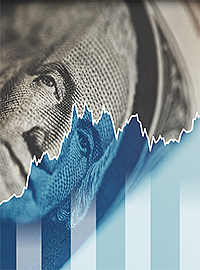| Candidates: Don't Let Interest Costs Derail Your Presidential Plans |
 |
|
By Veronique de Rugy
Thursday, January 18 2024 |
Remember when Republicans on the campaign trail would talk about how they would make sure to put the U.S. on a fiscally sane path? I miss that time. While a few of the current crop have paid lip service to the idea of constraining spending, no one seems to have a clear plan about how to do it. It's unfortunate. Letting the spending trajectory we're on further deteriorate will hinder any plans these candidates have for their presidency. It could even jeopardize the fight against inflation. As a reminder of our fiscal situation, according to the Congressional Budget Office, we were running a $1.5 trillion deficit in May 2023. That's quite a spectacular number whether in a time of full employment, economic downturn or emergency. This is in large part due to the spectacular increase in spending to $6.4 trillion. Data compiled by Brian Riedl show that in a little less than two years, "President Biden added $4.8 trillion to 10-year deficits." As a result, deficits are now projected to exceed $3 trillion in a decade. Naturally, this means lots of debt. Overall debt just crossed over the $34 trillion level with no decrease in sight. Riedl adds that, depending on which assumptions one looks at, it will equal between 181% and 340% of America's annual GDP in the next 30 years. His projections are based on the CBO numbers, but I think that's too optimistic. That's in part because interest rates are likely to be higher than what's being projected. That means high interest payments for years to come. This will not necessarily change even if the fight against inflation is really won. In a recent article, Jack Salmon of the Philanthropy Roundtable looks back at the path of interest rates and interest payments during the decade following the last major U.S. inflation period. "In the early 1980s," Salmon writes, "when interest rates reached double-digit percentages, exceeding 14 percent, and then took some time to subside, the nation witnessed a dramatic rise in interest payments, peaking in the early 1990s at 3.16 percent of GDP." This came at a time when the average maturity of the debt was even shorter than ours is today (5 years as opposed to our current 5.9 years). We should take no comfort in our slight advantage of longer repayment terms. According to the Department of the Treasury, the majority of our debt has a maturity of three years or less, and 31% has a maturity of a year or less. That's not a long time. Also, while interest rates back in the 1980s were a little over twice our current level, the debt-to-GDP ratio was roughly four times lower than where it is today. So even if we assume, wrongly in my opinion, serious relief from interest rates and inflation, we should still count on interest payments staying high for a long time, like they did in the 1980s. They are already quite significant as the cost of servicing the debt has gone up from $476 billion in fiscal year 2022 to $659 billion in 2023. It is projected to hit $745 billion this year and $1.4 trillion in 10 years. That's an important chunk of our budget going on autopilot, joining the part already dedicated to entitlement programs. With so much money already allocated, the next president won't have much to use for whatever else he or she wants to do. Of course, it would get much worse if interest rates go up again and inflation persists. Sadly, if politicians continue with the borrowing and spending, there is a good chance of that happening. After all, we got to this point after the pandemic spending splurge. There's one more reason to take this seriously. The value of owning government bonds is based on the value of the expected future payoff. These payoffs come from primary surpluses (budget surpluses excluding interest payments). The larger the future primary surpluses, the higher the projected return for investors, and the lower the interest rates they'll demand for holding the debt. We, however, only have primary deficits in our future, which eventually lead enough investors to worry about repayment that they demand higher interest rates and fuel fear of more inflation. These elevated interest payments should be at the center of all candidates' presidential plans, because they will either reduce the ability to spend money or to cut taxes. In the worst-case scenario, it could mean that much of the next presidency will be consumed by beating inflation back ... again. Veronique de Rugy is the George Gibbs Chair in Political Economy and a senior research fellow at the Mercatus Center at George Mason University. COPYRIGHT 2024 CREATORS.COM |
Related Articles : |
























